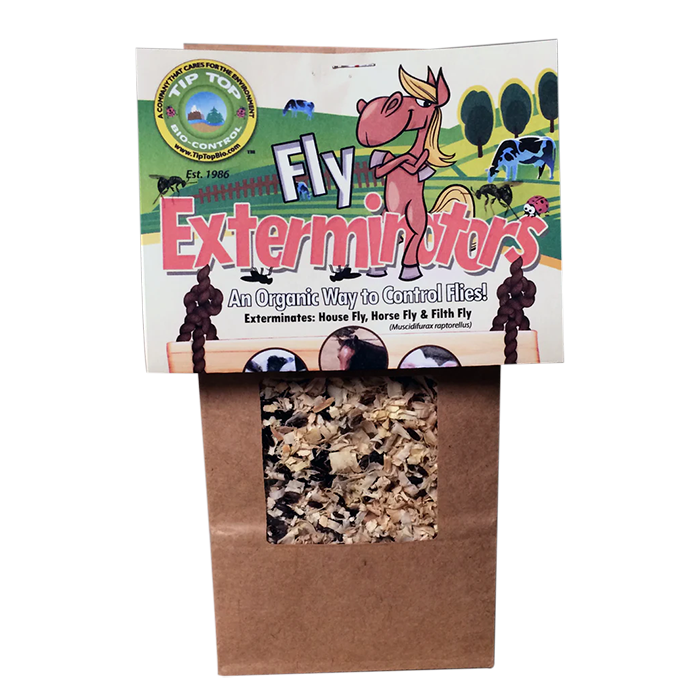An Organic Way To Control & Exterminate Flies!
Live insects from Tip Top Bio Are Expedited To Ensure Your Insects Arrive Quickly & Safely.
These small parasitic wasps are the most natural enemy of flies during the pupa stage. We provide several species of the tiny wasps in the genera Muscidifurax and Spalangia that attack and have adapted to different climates with a higher proportion of Spalangia in proportion to Muscidifurax. The eggs of the parasitic wasps are laid inside the flies pupae and the developing flies provide food from within for the young wasps.
Parasitic wasps do not bite, sting, swarm or bother anything else, humans or animals included. Parasitic wasps are nocturnal and are rarely seen during the day. They operate to a depth of 8 inches in the manure, homing in with their biological radar on fly larvae that are about to pupate.
Parasitic wasps arrive in woodshavings developing inside the fly pupa and when fully grown they will cut a hole in the pupal case and exit as adults searching for more fly larvae, seeking to lay their eggs where the flies pupate. The parasites must not be left in direct sunlight or hot areas. They need to be held at 70° to 80°F, increasing to 85°F for more rapid emergence. They should be emerging and ready to release within a day or two.
Target Pest:
Controls flies in animal manure accumulations and other filth fly breeding sites. Very effective against the housefly, biting stable flies, garbage flies, and the lesser housefly which make up to 95% of the flies in manure and other site accumulations. Five percent of the other flies are also parasitized, such as false stable flies, face flies, flesh flies and horn flies, but control is less complete on those flies which complete their life cycle widely dispersed in the pasture.
Life Span:
A generation of fly parasites is completed every 3 weeks yielding a steady reproduction of parasites. An adult wasp lives about 10 days. With the geometric increase in populations, a reduction in flies can be expected in 4 to 6 weeks. Almost every fly breeding at your location will eventually be killed. Flies still can be migrating in, so biological control would work best if the whole neighborhood would use biological control.
Strategic Considerations:
All natural enemies of flies are susceptible to pesticides, particularly when directed at manure. Adult populations may be reduced with poison baits. Adult fly resting areas should only be sprayed with long residual pesticides. In doing this you will conserve the natural enemies and prevent the development of resistance and reduce toxic pollution.
